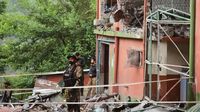On Wednesday, May 7, 2025, tensions between India and Pakistan escalated dramatically as India launched missile strikes against Pakistan in response to a recent militant attack in Indian-administered Kashmir. This military action, dubbed "Operation Sindoor," is being described by Pakistan as a "blatant act of war," with the potential to ignite a larger conflict between the two nuclear-armed neighbors.
Pakistan’s Prime Minister Shehbaz Sharif convened a National Security Committee meeting on the same day, condemning India’s strikes as illegal and a violation of Pakistan’s sovereignty. Sharif stated, "Pakistan has every right to give a robust response to this act of war imposed by India, and a strong response is indeed being given." This sentiment reflects the heightened tensions in a region that has been a flashpoint for decades.
The missile strikes occurred overnight on May 6-7, targeting at least nine sites across Pakistan and Pakistan-administered Kashmir. Initial reports indicate that at least 26 people were killed, including women and children, with an additional 38 injured. The strikes also reportedly damaged infrastructure, including a dam in Pakistan-administered Kashmir.
In retaliation, the Pakistani military claimed to have shot down several Indian aircraft, with reports of at least five jets downed, including advanced French-made Rafales. The Indian military has yet to confirm these claims, but tensions remain high along the Line of Control, which divides the heavily militarized region of Kashmir.
The backdrop to this violence is rooted in a deadly attack on April 22, 2025, when gunmen killed 26 people, primarily Indian Hindu tourists, near Pahalgam in Indian-administered Kashmir. India has accused Pakistan of harboring the militants responsible for this attack, a claim that Islamabad vehemently denies. Indian Foreign Secretary Vikram Misri stated that intelligence indicated further attacks against India were imminent, justifying the preemptive strikes.
As the situation unfolded, Indian Prime Minister Narendra Modi called an emergency cabinet meeting and postponed his planned trip to Europe. Modi’s government has faced criticism for its handling of the Kashmir situation, with Pakistan accusing India of using military action to bolster domestic support.
Reports from the ground describe scenes of panic and destruction in affected areas. Residents in Muzaffarabad, the capital of Pakistan-administered Kashmir, recounted fleeing their homes as missiles struck nearby. One resident, Muhammad Shair Mir, described the chaos: "The whole house moved. Everyone got scared, we all evacuated, took our kids and went up into the hills." This sense of fear is palpable, with many locals expressing concern that the next missile could hit their homes.
The escalation of violence has drawn international concern, with various world leaders urging both nations to exercise restraint. UN Secretary-General Antonio Guterres emphasized that "the world cannot afford a military confrontation between India and Pakistan," while China expressed regret over India’s military actions and called for calm.
In India, the government has framed the strikes as necessary and measured, asserting that they targeted terrorist camps linked to the militant groups responsible for past attacks. The Indian Defense Ministry stated, "Our actions have been focused, measured and non-escalatory in nature. No Pakistani military facilities have been targeted." This assertion, however, has been met with skepticism in Pakistan, where officials argue that civilians have borne the brunt of the strikes.
The conflict over Kashmir is long-standing, with roots tracing back to the partition of British India in 1947. Both countries claim the region in full, leading to multiple wars and ongoing military skirmishes. The current situation marks one of the most intense military confrontations in years, raising fears of a broader conflict.
In the wake of the strikes, civil defense drills were planned in several Indian states, a rare occurrence in peacetime, signaling the seriousness of the situation. Analysts warn that the risks of escalation are real, with both countries demonstrating a willingness to deploy significant military force despite their nuclear capabilities.
As the day progresses, funeral rites are set to begin for those killed in the Indian attacks, with heavy shelling resuming along the Line of Control. The international community watches closely, hoping for a de-escalation before the situation spirals further out of control.
With the stakes at an all-time high, the future of India-Pakistan relations hangs in the balance, as both sides prepare for potential further military actions. The world remains on edge, aware that any miscalculation could lead to catastrophic consequences in an already volatile region.




